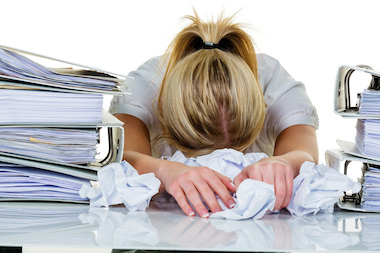Most full-time workers suffer from burnout

Staff are experiencing emotional and physical exhaustion as they struggle to switch off from their jobs and spend quality time with friends and family
Jermaine Haughton
Employers must prioritise the workplace wellbeing of staff, as new research from Virgin reveals more than half of full-time workers in Britain suffer burnout or anxiety at work. The report found that 51% of employees feel overworked and that it has left them feeling emotionally or physically exhausted.
Ahead of a Virgin Disruptors event on April 23, which will debate the future of workplace wellbeing, the research shows that exhaustion or anxiety at work – both physical and emotional – is most common among workers aged between 25 and 34, with 57% of respondents claiming they agonise from the issues.
Amy Leaper, head of People Innovation at Virgin Management, says high stress levels can be triggered in numerous ways.
"The growing incidence of high stress levels and exhaustion at work is a real concern,” says Leaper. “The challenging economic environment has, in many cases, resulted in the pressure to do more with less, so employees experience burnout when the demands of work become too much. We are now living in a hyper-connected world, which also means that people really struggle to switch off and work frequently spills over into personal life."
Almost a quarter of adults working full-time said their job has a negative or very negative impact on their home life (24%), with people aged 55 and over feeling the impact most (29%). Clearly dissatisfied by their job, three-quarters (74%) of women and 59% of men admitted to moaning about their work to friends and family.
The report also identifies how work has become all-consuming in people’s lives. One quarter of full-time workers said they spend more time with colleagues than anyone else. Only 4% of respondents spend more time with their friends and a mere 13% are fortunate enough to spend more time with family than their colleagues.
High stress and anxiety put the mental and physical health of employees at risk. According to the Department of Work and Pensions, an estimated 130 million days are lost to sickness absence each year and working age ill-health costs the economy around £100bn a year.
"Employers need to recognise the importance of employee wellbeing, and our Virgin Disruptors debate will put this under the spotlight,” adds Leaper. “There are many ways, often at little expense, in which companies of any size can help to bring balance to workers' lives.
"We know that a happy and healthy workforce is a more creative and motivated workforce, which is ultimately better for business performance. The first steps are listening to your people about what would make the biggest difference and reviewing existing benefits to see how they can be flexed to give people options and best meet their needs."
Barbara Dewast, 32-year-old co-founder of Workout at Work – a health and wellbeing start-up, says her previous career as a city lawyer taught her that work-life balance is still a taboo subject among corporate firms.
Married with three young children, Dewast said: "Like most city workers, I would wake up early and be out of my front door to drop off my toddlers at nursery by 7.30am. From the time I arrived at work there would be no real break until early evening. I would force myself to leave the office to kiss my children goodnight and then log-on after dinner and work until late. After spending time with my family and trying to maintain a social life, there was no time left to exercise or take care of my body and mind.
"Employees are anxious about voicing concerns about their workload and stress levels so they just battle on alone which can result in burnout. Stress management techniques such as mindfulness or a regular pilates or yoga session should be a policy in every company to help employers maintain a healthy business."
Image courtesy of Shutterstock

Press & Media Enquiries
For more information or to request interviews, contact CMI's Press Team on 020 7421 2705 or email press.office@managers.org.uk


